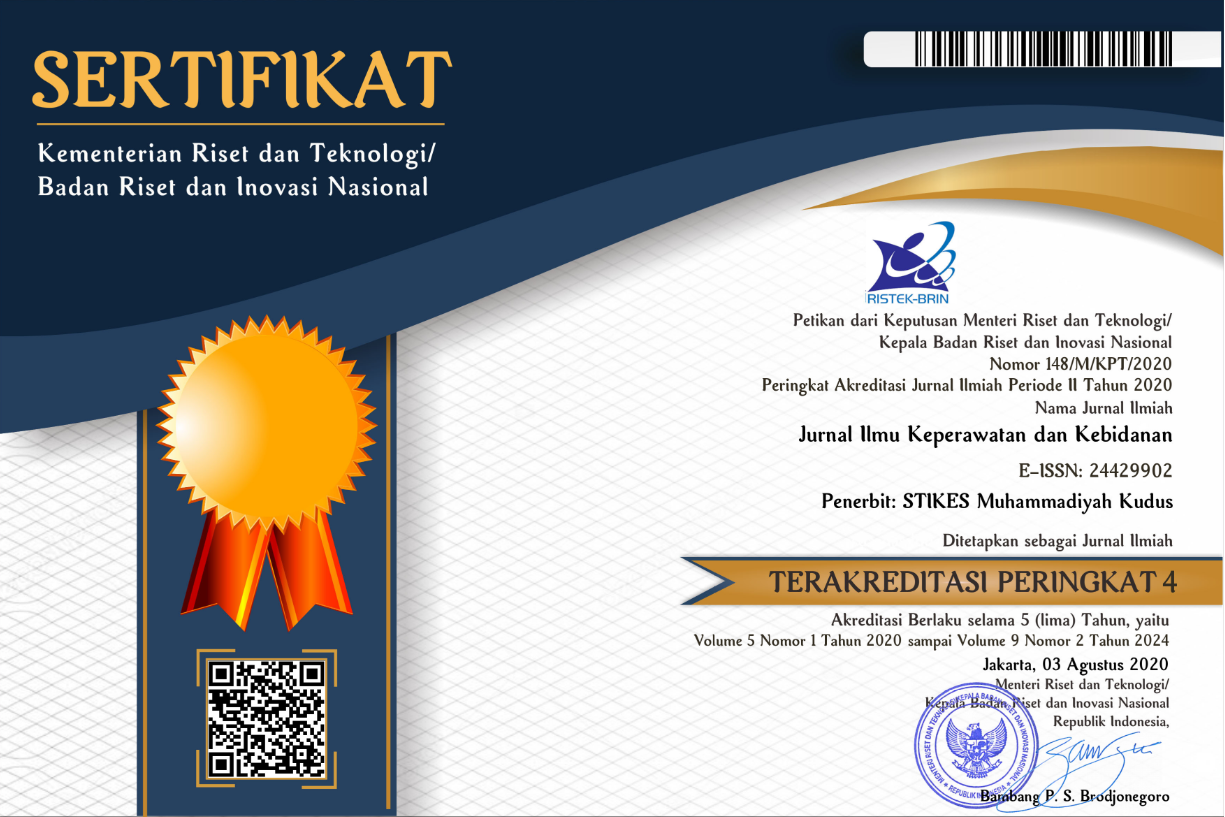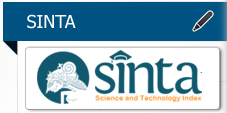INTEGRATING DAN OBLIGING SEBAGAI GAYA MANAJEMEN KONFLIK DALAM MENGURANGI STRES KERJA PERAWAT PELAKSANA
Abstract
Abstrak
Organisasi profesi yang berperan besar dalam pelaksanaan asuhan keperawatan di rumah sakit adalah keperawatan yang juga berpotensi mengalami konflik. Konflik mengakibatkan kerugian diantaranya stres kerja pada perawat pelaksana. Manajemen konflik merupakan prioritas utama kepala ruangan untuk mengatasi hal tersebut. Untuk mengidentifikasi pengaruh gaya manajemen konflik integrating dan obliging dalam mengurangi stres kerja perawat pelaksana. Penelitian ini adalah kuantitatif dengan desain penelitian cross sectional. Populasi penelitian adalah perawat pelaksana di RS Imelda Pekerja Indonesia dan RS Martha Friska dimana teknik pengambilan sampel adalah simple random sampling. Jumlah responden sebanyak 105 orang perawat pelaksana. Instrumen yang digunakan berupa kuesioner yang dianalisis secara bivariat dengan menggunakan program komputer. Hasil penelitian: 1) terdapat pengaruh gaya manajemen konflik integrating terhadap stres kerja perawat pelaksana (p = <0,001;PR=1,28 95%CI 1,174-1,402), dan 2) terdapat pengaruh gaya manajemen konflik obliging terhadap stress kerja perawat pelaksana (p=<0,001;PR = 1,20 95%CI 1,124-1,295. Gaya manajemen konflik integrating dan obliging kepala ruangan berpengaruh dalam mengurangi stres kerja perawat pelaksana.
Kata Kunci: Integrating, Obliging, Stres Kerja Perawat
Abstract
Professional organizations that play a major role in the implementation of nursing care in hospitals are nursing that also has the potential to experience conflict. Conflicts result in losses including work stress on implementing nurses. Conflict management is the chief priority of the nurse manager to overcome this.
To identify the influence of integrating and obliging conflict management styles in reducing the work stress of implementing nurses. This research is quantitative with cross sectional research design. The study population was implementing nurses at the Indonesian Hospital Imelda Worker and Martha Friska Hospital where the sampling technique was simple random sampling. The number of respondents was 105 implementing nurses. The instrument used was a questionnaire that was analyzed bivariately using a computer program.The results of the study were 1) there was an influence of integrating conflict management style on the work stress of implementing nurses (p=<0.001; PR=1.28 95% CI 1.174-1,402), and 2) there was an influence of obliging conflict management style on nurses work stress executor (p=<0.001; PR=1.20 95% CI 1.124-1.295). Integrating conflict management style and obliging head of the room influence in reducing the work stress of implementing nurses.
Keywords: Integrating, Obliging, Nurse Stress
Full Text:
PDFReferences
DAFTAR PUSTAKA
Akuffo, I. N. (2015). The influence of supervisors conflict management style on employees counterproductive work behaviours. European Journal of Business and Management, 7(30), 28-33.
Al-Hamdan, Z., Shukri, R., & Anthony, D. (2011). Conflict management styles used by nurse managers in the Sultanate of Oman. Journal of clinical nursing, 20(3-4), 571–80.
Barker, D. P. (2012). Work Stress/Strain, Low Job Satisfaction, And Intent To Leave Home Health Care Nursing Among Home Health Care Registered Nurses ((HHC RNs). ProQuest.
Brinket, R. (2010). A literature review of conflict communication causes, costs, benefits, and intervensions in nursing. Journal of Nursing Management, 18,145-156.
Cavanagh, S. J. (1991). The conflict management style of staff nurses and nurse managers. Journal of advanced nursing, 16(10), 1254–60.
DuBrin, A. J. (2015). Human Relations Interpersonal Job-Oriented Skills (12th ed.). New York: Pearson Education Limited.
Edwin, R. W. (2013). Conflict management strategies adopted by commercial banks in Kenya. (TA No. 62804/D61/2010). Unpublished undergraduate thesis, University of Nairobi, Kenya.
Fahmi, I. (2013). Manajemen Kepemimpinan, Teori dan Aplikasi. Bandung: Alfabeta
Ivancevick, J., Konopaske, R., & Matteson, MT. (2007). Prilaku dan Manajemen Organisasi. Jilid 2. Jakarta: Erlangga.
Jennings, M. B. (2008). Work Stress and Burnout Among Nurses: Role of the Work Environment and Working Conditions. In R. G. Hughes, Patient Safety and Quality: An Evidence –Based Handbook for Nurses (p. Ch 26). Rockville: AHRQ.
Luthans, F. (2011). Organizational behavior : an evidance based approach. 12th ed. USA: The Mcgraw-Hills Companies. Inc.
Maisoglou, I. (2014). Conflict Management in a Greek Public Hospital : Collaboration or Avoidance?. International Journal of Caring Sciences. 7 , 75-82.
Nasution, B. (2010). Manajemen Sumber Daya Manusia Strategis. Medan: FISIP USU Press.
Perry & Potter. (2005). Fundamental keperawatan. Konsep, proses, dan praktek. Edisi 4. Jakarta: EGC.
Prause, D., & Mujtaba, B. G. (2015). Conflict management practises for differs workplaces. Journal of Business Studies Quarterly, 6(3), 14-22.
Rahim, M. A. (2002). Toward a theory of managing organizational conflict. International Journal of Conflict Management, 13(3), 206-235.
Robbins, S.P. & Judge, T.A. (2015). Perilaku Organisasi. Edisi 16. Jakarta: Salemba Empat.
Saeed, T., Almas, S., Anis-ul-Haq, M., & Niazi, G. (2014). Leadership styles: relationship with conflict management styles. International Journal of Conflict Management, 25(3), 214-225.
Shih, H.A., & Susanto, E. (2010). Conflict management styles, emotional intelligence, and job performance in public organizations. International Journal of Conflict Management, 21(23), 147-168.
Sinaga, H. H. (2010). Pengaruh manajemen konflik terhadap kinerja karyawan pada PT. bpr mitradana madani Medan. (TA No. 050502059/MAN/2010). Unpublished undergraduate thesis. Universitas Sumatera Utara, Medan.
Spears, A. (2008). Work Related Stres. Victoria: Health and Safety Executive Inc.
Toren, O. & Wagner, N. (2010). Applying an ethical decision-making tool to a nurse management dilemma. Journal of Nursing Etnics, 17 (3), 393-402.
Tribowo, C. (2013). Manajemen Pelayanan Keperawatan di Rumah Sakit. Jakarta: Trans Info Media.
Whitworth, B. S. (2008). Is there a relationship between personality type and preferred conflict-handling styles? An exploratory study of registered nurses in southern Mississippi. Journal of nursing management, 16(29), 921
WHO. (2003). Work Organisation and Stress. Geneva: WHO
Wirawan. (2013). Konflik dan Manajemen Konflik : Teori, aplikasi dan penelitian. Jakarta : Salemba Humanika.
DOI: https://doi.org/10.26751/jikk.v11i2.848
Refbacks
- There are currently no refbacks.
Universitas Muhammadiyah Kudus - LPPM Universitas Muhammadiyah Kudus
Jl. Ganesha 1 Purwosari Kudus 59316
Tel/ Fax +62-291-437218 Email : lppm@umkudus.ac.id
Jurnal Ilmu Keperawatan dan Kebidanan Indexed by:

This work is licensed under a Creative Commons Attribution-ShareAlike 4.0 International License.













